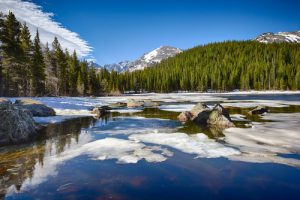
U.S. Sen. Cory Gardner (R-CO) is pushing back against proposed entrance fee hikes at some of America’s most-visited national parks, including Rocky Mountain National Park (RMNP) in his home state.
“I have concerns that sudden and dramatic increases in the costs of passes for both private individuals and commercial operations could have unforeseen negative consequences on the communities that rely on visitation to these parks to keep their economies thriving,” Gardner wrote in a Feb. 1 letter to U.S. Department of Interior Secretary Ryan Zinke.
“I write to request that you delay the implementation of and work with the stakeholders on the proposed targeted fee increase at 17 national parks,” the senator wrote.
The National Park Service (NPS), which maintains the U.S. parks, is reviewing more than 100,000 public comments received in its proposal to raise peak-season entrance fees at 17 national parks, where, if implemented, the new fee structure would be applied at Yellowstone, the Grand Canyon, Yosemite and Zion National Parks, among others that have peak seasons starting May 1; and at RMNP, Shenandoah, Acadia and Mount Rainier National Parks where peak seasons begin June 1. The increased fees would generate revenue that is needed to improve the aging infrastructure of all national parks, according to NPS.
Sen. Gardner acknowledged the federal government’s “urgent need to address the more than $11 billion maintenance backlog on lands managed by the National Park Service,” but stressed to Zinke that any forthcoming changes “not cause a reduction in visitation that could affect the local economies that support the parks.”
“I stand ready and willing to work with you to find a legislative solution to the maintenance backlog that will more ably address the issue,” said Gardner, who also urged Zinke to unite with stakeholders before finalizing any proposal for the fee structure.
The senator also expressed specific concerns about negative economic repercussions on communities near RMNP. He noted that cost increases could be more than 100 percent for private individual passes and 400 percent on commercial operator passes. He noted having “serious concerns” about the proposed termination of day pass sales at RMNP, the only national park issuing such passes. Day passes generate the most revenue for the park, he wrote.
“I do not believe the elimination of this pass would increase either visitation or revenue to the park,” Gardner wrote. “The more likely outcome is the purchase of more annual passes, which when purchased online do not see the park benefit from the revenue generated by the sale.”
NPS estimates that the proposed peak season fee increase could fuel $70 million more in national park revenue per year.



